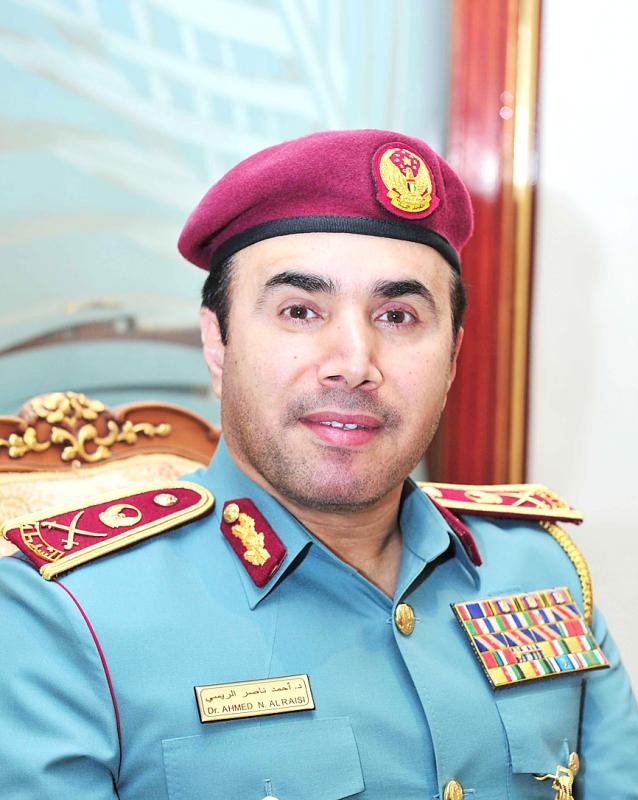Interpol elected an Emirati general accused of torture as its new president on Thursday, despite concerns of human rights organizations that fear the agency would be at risk of exploitation by repressive regimes.
The appointment follows generous funding by the United Arab Emirates (UAE) for the Lyon, France-based body and accusations that Abu Dhabi has abused Interpol’s system of so-called “red notices” for wanted suspects to persecute political dissidents.
Emirati Major General Ahmed Naser al-Raisi was elected following three rounds of voting during which he received 68.9 percent of votes cast by member countries, Interpol said in a statement.

Photo: EPA-EFE
After his election, al-Raisi wrote on Twitter that he would “build a more transparent, diverse and decisive organization that works to ensure safety for all.”
Al-Raisi did not address the accusations, but said that the “UAE has become one of the safest countries in the world.”
Complaints of “torture” were in the past few months filed against the general in France and Turkey, which is hosting Interpol’s general assembly in Istanbul this week.
Al-Raisi, who heads the UAE’s security forces, is to take on a largely ceremonial and part-time voluntary role for a four-year term.
Interpol secretary-general Juergen Stock handles day-to-day running of the organization. He was appointed for a second five-year term in 2019.
Al-Raisi is to take over from Kim Jong-yang, a South Korean police official who has been Interpol president since the 2018 arrest of his predecessor, Meng Hongwei (孟宏偉), in China, where he had served as a vice minister of public security.
The only other candidate for the post was Sarka Havrankova, a veteran Czech police officer overseeing the country’s international cooperation in police matters.
Another appointment to Interpol’s executive committee — Chinese senior public security official Hu Binchen (胡彬郴) — similarly sparked anger.
China has come under increasing criticism from rights groups and some governments amid claims that actions towards Uighurs and other minority groups in the northwestern region of Xinjiang amount to genocide.
The rights group World Uyghur Congress described the election as “very disheartening.”
In a letter this month, 50 lawmakers from 20 countries belonging to the Inter-Parliamentary Alliance on China protested his candidacy.
They warned that his election would have “grave consequences for the safety and well-being of Chinese, Hong Kongers, Taiwanese and Chinese human rights activists living outside China as well as Tibetan and Uyghur diasporas.”
Al-Raisi joined the Emirati police force in 1980 and worked there for several decades.
Hiba Zayadin, a Gulf region researcher for Human Rights Watch, condemned the election of “a representative of arguably the most authoritarian government in the Gulf.”
She wrote on Twitter that it was a “sad day for human rights and the rule of law worldwide.”
One of the complainants against al-Raisi involves British national Matthew Hedges, who said he was detained and tortured between May and November 2018 in the UAE after he was arrested on false charges of espionage during a study trip.
In another complaint, lawyers for the Gulf Center for Human Rights accuse al-Raisi of “acts of torture and barbarism” committed against UAE government critic Ahmed Mansoor.

Kehinde Sanni spends his days smoothing out dents and repainting scratched bumpers in a modest autobody shop in Lagos. He has never left Nigeria, yet he speaks glowingly of Burkina Faso military leader Ibrahim Traore. “Nigeria needs someone like Ibrahim Traore of Burkina Faso. He is doing well for his country,” Sanni said. His admiration is shaped by a steady stream of viral videos, memes and social media posts — many misleading or outright false — portraying Traore as a fearless reformer who defied Western powers and reclaimed his country’s dignity. The Burkinabe strongman swept into power following a coup in September 2022

‘FRAGMENTING’: British politics have for a long time been dominated by the Labor Party and the Tories, but polls suggest that Reform now poses a significant challenge Hard-right upstarts Reform UK snatched a parliamentary seat from British Prime Minister Keir Starmer’s Labor Party yesterday in local elections that dealt a blow to the UK’s two establishment parties. Reform, led by anti-immigrant firebrand Nigel Farage, won the by-election in Runcorn and Helsby in northwest England by just six votes, as it picked up gains in other localities, including one mayoralty. The group’s strong showing continues momentum it built up at last year’s general election and appears to confirm a trend that the UK is entering an era of multi-party politics. “For the movement, for the party it’s a very, very big

ENTERTAINMENT: Rio officials have a history of organizing massive concerts on Copacabana Beach, with Madonna’s show drawing about 1.6 million fans last year Lady Gaga on Saturday night gave a free concert in front of 2 million fans who poured onto Copacabana Beach in Rio de Janeiro for the biggest show of her career. “Tonight, we’re making history... Thank you for making history with me,” Lady Gaga told a screaming crowd. The Mother Monster, as she is known, started the show at about 10:10pm local time with her 2011 song Bloody Mary. Cries of joy rose from the tightly packed fans who sang and danced shoulder-to-shoulder on the vast stretch of sand. Concert organizers said 2.1 million people attended the show. Lady Gaga

SUPPORT: The Australian prime minister promised to back Kyiv against Russia’s invasion, saying: ‘That’s my government’s position. It was yesterday. It still is’ Left-leaning Australian Prime Minister Anthony Albanese yesterday basked in his landslide election win, promising a “disciplined, orderly” government to confront cost-of-living pain and tariff turmoil. People clapped as the 62-year-old and his fiancee, Jodie Haydon, who visited his old inner Sydney haunt, Cafe Italia, surrounded by a crowd of jostling photographers and journalists. Albanese’s Labor Party is on course to win at least 83 seats in the 150-member parliament, partial results showed. Opposition leader Peter Dutton’s conservative Liberal-National coalition had just 38 seats, and other parties 12. Another 17 seats were still in doubt. “We will be a disciplined, orderly